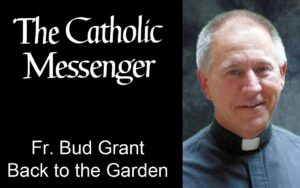By Father Bud Grant
Fall is the season of nostalgia. While preparing for the dim winter in the already waning daylight we can’t help but wistfully recall the lighter days of a lost summer. On Oct. 4 we looked even further back, 793 years, to St. Francis of Assisi. In Iowa his feast has a particular significance. On that day, 40 years ago, Pope John Paul II visited us.
As an acolyte, I stood next to the Holy Father, bearing his miter. At the Eucharistic prayer, when a priest would have prayed for “John Paul, our Pope, Maurice our Bishop…” and the Bishop would have prayed for “John Paul our Pope, me your unworthy servant…” he said “Pray for me your most unworthy servant…” I was shocked, looking to the 300,000 souls huddled among the rolling slopes, wondering how he could say that he was “most unworthy.” Then I realized: John Paul was reminding us that it wasn’t about him but, rather, that “Christ is all” (Col. 3:11).
 This unsettling sentiment of “unworthiness” comes from Luke 17:10: as if after serving (διακόνει) food and drink at a master’s table — referencing the Eucharist — disciples are to say “we are useless slaves, we have only played the part assigned to us.” Luke is reminding us to be humble “servers,” less focused on our goals than on our duty. Luke’s Christ always wants to shock us into humility … and duty.
This unsettling sentiment of “unworthiness” comes from Luke 17:10: as if after serving (διακόνει) food and drink at a master’s table — referencing the Eucharist — disciples are to say “we are useless slaves, we have only played the part assigned to us.” Luke is reminding us to be humble “servers,” less focused on our goals than on our duty. Luke’s Christ always wants to shock us into humility … and duty.
Humility (from “humus,” earth/dirt/soil, and the opposite of hubris) is natural to anyone who works with the land, whether farmer, ecologist or gardener. Creation itself shocks us out of our complacent confidence that we are in control. We need this jolting disruption if we are to heed the pope’s admonishment to “cooperate with the Creator in the very sustenance of life on earth.” Furthermore, it is our best response to the devastating disruptions of climate change.
Humbly admitting that we are causing the climate emergency disrupts our rutted patterns of controlling nature, urging us to make uncomfortable changes, like, perhaps, paying fees for our share of environmental destruction. And this, in turn, would change destructive behaviors. We have a name for that: “conversion.”
Faith isn’t that we can escape crucifixion but trust that we can pass through it. Hope is that creative disruption precedes resurrection. Love means redistributing the world’s suffering onto our own shoulders as “stewards of a gift from God which was intended for the good of all humanity.”
Roman Catholic environmental theology was born in Iowa on Oct. 4, 1979. Since Pope Leo XIII, popes have reminded us of the usefulness of God’s creation. But Pope John Paul echoes St. Francis by intimating that nature exists, not only for our use, but because it is God’s creation: “In Christ alone all creation is restored to its proper order.”
To care for creation is to serve the altar of the Eucharist:
“Come, all of you, to Christ. He is the bread of life…”
“Bring with you to Christ the products of your hands, the fruit of the land, “which earth has given and human hands have made.” At this altar these gifts will be transformed into the Eucharist of the Lord.”
“Bring with you your efforts to make the land fruitful, your labor and your weariness. At this altar, because of the life, death and resurrection of Christ, all human activity is sanctified, lifted up and fulfilled.”
“Bring with you the poor, the sick, the exiled and the hungry; bring all who are weary and find life burdensome. At this altar they will be refreshed, for his yoke is easy and his burden light.”
“Above all, bring your families and dedicate them anew to Christ, so that they may continue to be the working, living and loving community where nature is revered, where burdens are shared and where the Lord is praised in gratitude.”
— Pope John Paul II, Oct. 4, 1979, Living History Farms, Iowa
(Father Bud Grant is a professor of theology at St. Ambrose University in Davenport.)











